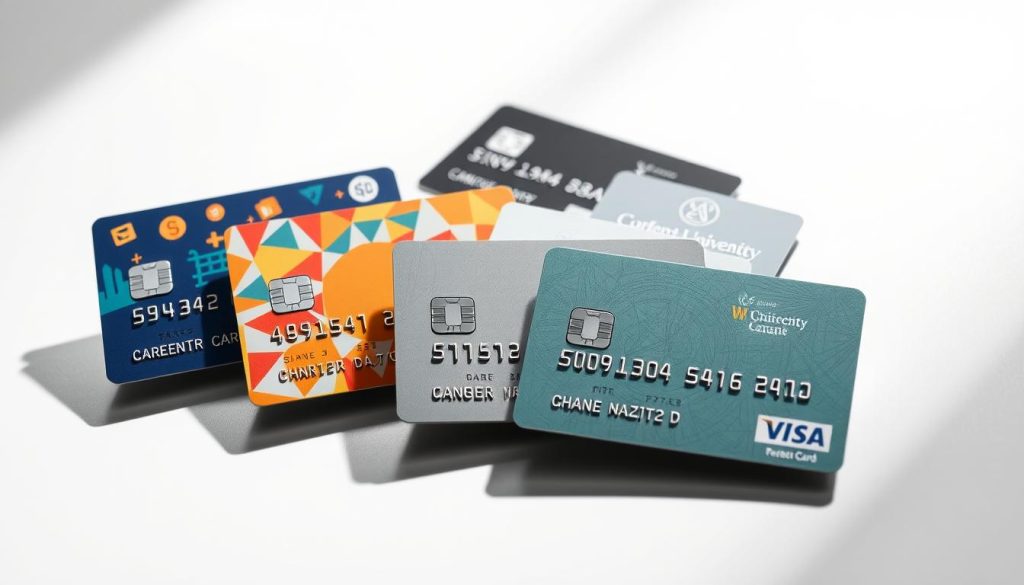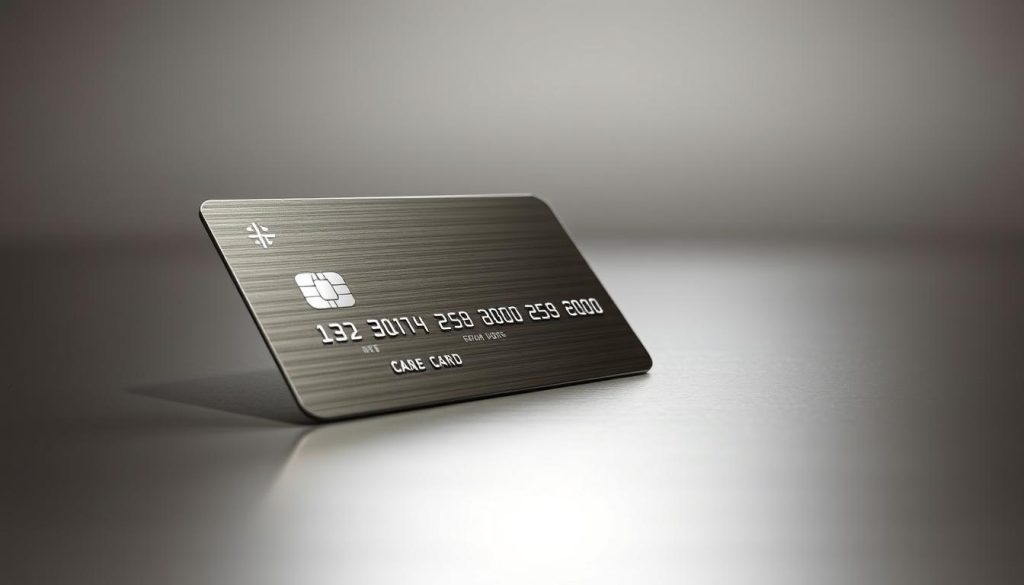As a student or young adult, finding the right credit card can be tough. You’re probably searching for cards that match your financial needs. Learning about financial literacy is crucial for making smart credit card choices.
You’re looking for student credit cards with perks like cashback, rewards, or low interest. These cards can help you build credit, which is vital for your financial future. By picking the right cards, you can learn good money habits and steer clear of common mistakes.

Introduction to Student Credit Cards
Student credit cards are made for students and young adults. They usually have lower limits and fewer rules, making them easier to get. Using these cards wisely can help you start a good credit history and boost your financial knowledge.
Key Takeaways
- Student credit cards are designed for students and young adults
- Credit cards for young adults can help you build credit
- Financial literacy is essential for making informed decisions about student credit cards
- Look for student credit cards with low interest rates and beneficial rewards
- Using credit cards for young adults responsibly can improve your financial future
Understanding Credit Cards for Students and Young Adults
For students and young adults, credit cards can seem daunting. There are many choices, making it key to know the differences. Student credit cards offer benefits like lower limits and fewer fees, perfect for those new to credit.
It’s important to see how student cards differ from regular ones. Student cards often have easier requirements and special rewards for students. Knowing these differences helps you choose the best card for you.

Building credit early is crucial. It affects your ability to get loans, apartments, and jobs later. Starting with a student credit card helps you build a good credit history. Key steps include:
- Making on-time payments
- Keeping credit utilization low
- Monitoring your credit report
By following these tips and understanding the benefits of student credit cards, you can start building a strong credit foundation. This sets you up for financial success in the long run.
Latest Trends in Student Credit Card Offerings
Exploring student credit cards? It’s key to know the newest trends and options. Financial technology is changing how we pay, with mobile and contactless payments on the rise. These digital methods are not just easy but also safer, cutting down fraud and identity theft risks.
Credit card companies are now focusing on what students need. Some cards give cashback on common buys like food, fuel, or streaming. These rewards can help you save money or earn points for perks. Knowing the current student credit card trends helps you pick the best card for you.
Here are some important features to look for in student credit cards:
- Low or no annual fees
- Competitive interest rates
- Generous rewards programs
- Flexible payment terms
By looking at these points and keeping up with student credit card trends and credit card offerings, you can find a card that suits you. The use of financial technology in these cards also makes payments smoother and safer.

Top Features to Look for in Your First Credit Card
When picking your first credit card, look at several important features. These features should match your spending habits and financial goals. The Annual Percentage Rate (APR) is key. It’s the interest rate you pay if you don’t clear your balance each month.
A good card should have rewards programs. These give you cashback or other perks for your purchases. For example, if you often buy groceries or gas, find a card that rewards you for these. Also, make sure the credit limits are right for you. They should be enough to cover your expenses but not so high that you overspend.
Here are some key factors to consider when evaluating your first credit card:
- APR: Look for a low APR to minimize interest charges
- Rewards programs: Choose a card that offers rewards that align with your spending habits
- Credit limits: Ensure the credit limit is suitable for your financial needs
- Fees: Be aware of any fees associated with the card, such as annual fees or late fees
By carefully considering these factors and choosing a credit card with features that meet your needs, you can set yourself up for financial success and make the most of your credit card experience.
Secured vs. Unsecured Student Credit Cards
When picking a credit card, you’ll find two main types: secured and unsecured. Secured credit cards need a deposit, usually the same as your credit limit. They’re easier to get, especially for students with little credit history. Unsecured credit cards, however, don’t need a deposit. They might offer bigger credit limits and more rewards.
Both types have their own security benefits and drawbacks. Secured cards add security since your limit is tied to your deposit. Unsecured cards might have better security features like zero-liability protection and fraud monitoring.
Here’s a quick comparison:
- Secured credit cards: require a deposit, easier to qualify for, lower credit limits
- Unsecured credit cards: no deposit needed, more generous limits and rewards, stricter rules
Choosing between a secured and an unsecured card depends on your financial situation and credit history. It’s key to consider the good and bad of each. Pick the card that suits your needs best.
How to Choose the Right Card for Your College Life
Choosing the right credit card is important. You need one that matches your lifestyle and spending habits. As a college student, your expenses can change a lot. You might spend on groceries, gas, entertainment, or textbooks.
To get the most from your card, think about your spending patterns. Look for cards that give rewards or cashback in your spending areas.
Understanding your credit score and history is key. If you’re a student with little credit history, consider a secured card or one with a lower limit. If your credit score is good, you might get cards with better rewards and benefits.
Here are some things to think about when picking a credit card:
- Annual fees and interest rates
- Rewards programs and cashback options
- Foreign transaction fees (if you plan to study abroad)
- Credit limit and credit score requirements
By researching and comparing different cards, you can find the best one for you. Always read the terms and conditions carefully. If you’re unsure, don’t hesitate to ask questions.
Building Your Credit Score Through Responsible Card Use
Understanding credit score building through responsible credit card use is key. Your credit history affects your financial health. Making smart choices can help you build a strong base.
To get a good credit score, pay on time and keep your credit use low. Avoiding negative marks on your report is also crucial. This way, you’ll build a positive credit history and boost your credit score over time.
Here are some important tips for responsible credit card use:
- Make on-time payments to avoid late fees and negative marks on your credit report
- Keep your credit utilization ratio below 30% to demonstrate responsible credit behavior
- Monitor your credit report regularly to dispute any errors or inaccuracies
By following these tips and using your credit card wisely, you can build a solid credit foundation. This will open up better financial opportunities in the future. Remember, credit score building takes time, patience, and responsible credit card use.
As you work towards financial stability, remember that a good credit history can lead to better loan rates and higher credit limits. By focusing on responsible credit card use and credit score building, you’ll be on the path to reaching your financial goals.
Common Application Requirements and Approval Tips
When you apply for a credit card, knowing the common requirements and tips can help. As a student, you might need to show proof of a job or scholarship. You’ll also need to provide identification and proof of enrollment.
To boost your chances, follow these approval tips: Make sure you meet the income needs, provide all needed documents, and have a good credit score. If you’re new to credit, consider a secured card or being an authorized user to build a positive credit history.
Here are some important things to think about when applying for a credit card:
- Income requirements: Check if you meet the minimum income needed, which varies by issuer.
- Documentation: Collect all required documents, like ID, proof of enrollment, and income proof.
- Credit history: Keep a good credit score, or look into other credit options if you’re new.
By following these tips and knowing the common application needs, you can up your chances of getting a credit card. Always read the terms and conditions of your credit card agreement. If you have questions or concerns, don’t hesitate to contact the issuer.
Protection Features and Security Benefits
Using a credit card should make you feel safe and protected from fraud. Many cards offer credit card protection like zero-liability policies and fraud monitoring. These help stop fraud prevention and keep your identity safe.
Also, many cards have security benefits like purchase protection, return protection, and extended warranties. These benefits give you more confidence when you buy things with your card.
Some important security benefits to look for in a credit card are:
- Zero-liability policy
- Fraud monitoring
- Identity theft protection
- Purchase protection
- Return protection
- Extended warranties
Knowing about these credit card protection features and security benefits lets you shop with confidence. Always check your card’s terms and conditions to see what fraud prevention measures are there for you.
Smart Ways to Manage Your Student Credit Card
As a student, managing your credit card well is key to keeping a good credit score. It helps you avoid financial trouble. To do this, set up payment reminders so you never miss a payment. Missing payments can hurt your credit score.
To start, you can set up automatic payments or reminders through your credit card issuer’s website or app. This way, you’ll get reminders when it’s time to pay. It’s also important to keep an eye on your credit usage to avoid spending too much and getting into debt.
Here are some tips to help you manage your student credit card:
- Set up payment reminders to ensure timely payments
- Monitor your credit usage to avoid overspending
- Avoid common pitfalls such as late fees and interest charges
By following these smart management strategies, you can use your credit card wisely. Always keep an eye on your credit usage and make payments on time. This way, you can avoid any bad effects on your credit score.
Conclusion: Making the Most of Your Student Credit Card Journey
Starting your student credit card journey is more than just getting rewards or convenience. It’s about building a strong financial base for your future. By using your card wisely, you’ll enjoy its benefits and start building a credit history. This history can open many doors for you later on.
Make the most of the educational resources available to you. This could be through your college’s financial programs or your credit card issuer’s info. Learning about managing credit, budgeting, and personal finance will help you make smart choices. It will also help you avoid common mistakes.
See your student credit card journey as a chance to learn and grow. Stay alert, ask for help when you need it, and always use your card responsibly. This way, you’ll unlock your credit card’s full potential and reach your financial goals.
FAQ
What are the latest trends in student credit card offerings?
The student credit card market is always changing. New trends include mobile payments and contactless transactions. Many cards now offer rewards like cashback on groceries and streaming services.
What are the key features to look for in a first credit card?
When picking your first credit card, look at the Annual Percentage Rate (APR). It’s the interest rate if you don’t pay in full each month. Also, check for rewards that match your spending, like cashback on groceries.
Consider the credit limit too. It should be enough for your needs but not too high to overspend. Look out for fees like annual or late fees. Choose a card with few or no fees.
What are the differences between secured and unsecured student credit cards?
You might choose between secured and unsecured student credit cards. Secured cards need a deposit and are easier to get. Unsecured cards don’t need a deposit but might have higher interest rates.
It’s key to know the differences. Pick the card that fits your financial situation and credit history.
How can I build my credit score through responsible credit card use?
A good credit score is crucial for your financial health. Use your credit card wisely. Make timely payments and keep your credit utilization low.
Also, avoid negative marks on your report. Check your credit report often and correct any errors. By doing this, you can improve your credit score over time.
What are the common application requirements and approval tips for student credit cards?
To apply for a credit card, you’ll need to meet income requirements and provide documents. As a student, you might need to show proof of income or enrollment. If you’re rejected, don’t worry.
You can try again or look for other credit options. Knowing what issuers look for can help you get approved and start building your credit.
What are the smart ways to manage a student credit card?
To manage your credit card well, set up payment reminders and track your spending. Avoid late fees and interest charges by paying on time and in full.
Be cautious of credit limit increases that might tempt you to overspend. By managing your card smartly, you can keep your credit score healthy.


